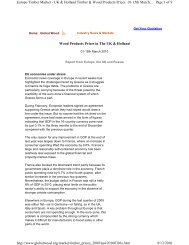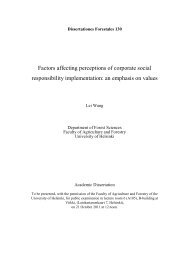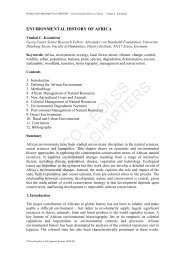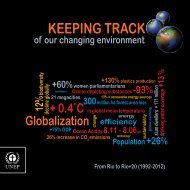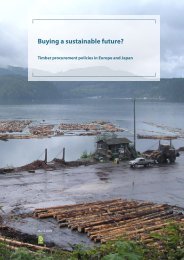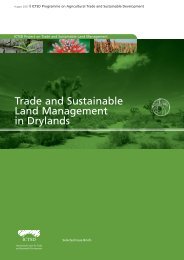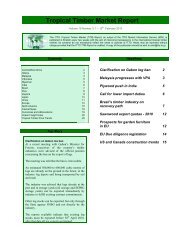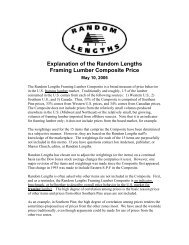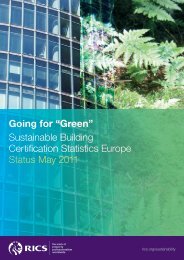ICT and e-Business in the Pulp, Paper and Paper ... - empirica
ICT and e-Business in the Pulp, Paper and Paper ... - empirica
ICT and e-Business in the Pulp, Paper and Paper ... - empirica
Create successful ePaper yourself
Turn your PDF publications into a flip-book with our unique Google optimized e-Paper software.
<strong>Pulp</strong>, paper <strong>and</strong> paper products<br />
(fourth party logistics) 120 providers <strong>in</strong> order to focus on <strong>the</strong>ir core bus<strong>in</strong>ess (e.g.<br />
production, market<strong>in</strong>g). In this case, <strong>the</strong> barga<strong>in</strong><strong>in</strong>g power of logistics companies will<br />
certa<strong>in</strong>ly <strong>in</strong>crease, as switch<strong>in</strong>g costs are high. Particularly if logistics are completely<br />
outsourced (e.g. to a 4PL), <strong>the</strong> decision is practically irreversible. This is a general risk<br />
<strong>in</strong>volved with outsourc<strong>in</strong>g.<br />
Barga<strong>in</strong><strong>in</strong>g power of customers<br />
The barga<strong>in</strong><strong>in</strong>g power of customers can differ considerably by <strong>in</strong>dustry <strong>and</strong> type of<br />
products. On <strong>the</strong> one h<strong>and</strong>, certa<strong>in</strong> customer segments depend critically on supplies from<br />
<strong>the</strong> paper <strong>in</strong>dustry, for example <strong>the</strong> publish<strong>in</strong>g <strong>and</strong> pr<strong>in</strong>t<strong>in</strong>g <strong>in</strong>dustry. On <strong>the</strong> o<strong>the</strong>r h<strong>and</strong>,<br />
<strong>the</strong> <strong>in</strong>creas<strong>in</strong>gly global dimension of competition opens up new options for buyers to<br />
switch suppliers.<br />
A good example to illustrate <strong>the</strong> distribution of power between P&P companies <strong>and</strong> <strong>the</strong>ir<br />
customers is a visit of representatives from lead<strong>in</strong>g German publish<strong>in</strong>g companies<br />
(<strong>in</strong>clud<strong>in</strong>g Axel Spr<strong>in</strong>ger, Holtzbr<strong>in</strong>ck <strong>and</strong> WAZ) to Moscow to explore opportunities <strong>and</strong><br />
conditions for paper imports from Russia. 121 The strategic objective of this visit was that<br />
publishers were try<strong>in</strong>g to become less dependent from <strong>the</strong>ir current suppliers <strong>in</strong> <strong>the</strong> EU.<br />
<strong>Paper</strong> producers had announced plans to consolidate <strong>the</strong> production capacity, 122 which<br />
could lead to an <strong>in</strong>crease <strong>in</strong> prices. <strong>Paper</strong> prices are a very important cost factor for<br />
publishers. Russia has vast resources <strong>in</strong> forestry, but <strong>the</strong> quality of most of <strong>the</strong> paper<br />
production does not yet comply with Western European st<strong>and</strong>ards.<br />
Thus, while barga<strong>in</strong><strong>in</strong>g power of customers from <strong>the</strong> publish<strong>in</strong>g <strong>in</strong>dustry may not be high<br />
<strong>in</strong> <strong>the</strong> short term, due to <strong>the</strong>ir dependency on paper as a raw material, <strong>the</strong>ir position may<br />
become stronger <strong>in</strong> <strong>the</strong> medium <strong>and</strong> long term, as <strong>the</strong> quality of paper from Russia <strong>and</strong><br />
Asia <strong>in</strong>creases. While <strong>the</strong>re is certa<strong>in</strong>ly a dynamic trend towards <strong>in</strong>ternationalisation (see<br />
Section 2.2.3), this development is not substantially l<strong>in</strong>ked to <strong>ICT</strong> <strong>and</strong> e-bus<strong>in</strong>ess.<br />
Obviously, <strong>ICT</strong> facilitate <strong>the</strong> data exchange with<strong>in</strong> different branches of <strong>in</strong>ternationally<br />
operat<strong>in</strong>g companies. In this sense, <strong>ICT</strong> is to some extent an enabler of <strong>in</strong>ternational<br />
trade, which <strong>the</strong>n <strong>in</strong>creases <strong>the</strong> barga<strong>in</strong><strong>in</strong>g power of customers; but it would be extremely<br />
far-fetched to establish a causal relation between e-bus<strong>in</strong>ess <strong>and</strong> customer power <strong>in</strong> <strong>the</strong><br />
P&P <strong>in</strong>dustry.<br />
For companies <strong>in</strong> <strong>the</strong> convert<strong>in</strong>g <strong>in</strong>dustries, <strong>the</strong> barga<strong>in</strong><strong>in</strong>g power of customers tends to<br />
be much stronger. For example, a major factor determ<strong>in</strong><strong>in</strong>g <strong>the</strong> implementation of RFID <strong>in</strong><br />
<strong>the</strong> packag<strong>in</strong>g <strong>in</strong>dustry is customer dem<strong>and</strong> (see Section 4.3.3). Particularly if customers<br />
are very large companies, for <strong>in</strong>stance from retail<strong>in</strong>g, <strong>the</strong> food, pharmaceutical or<br />
cosmetics <strong>in</strong>dustries, <strong>the</strong>y can exert considerable pressure on packag<strong>in</strong>g solution<br />
providers. The case study on VPK Packag<strong>in</strong>g is a good example illustrat<strong>in</strong>g how new<br />
customer requirements forced <strong>the</strong> company to reth<strong>in</strong>k its bus<strong>in</strong>ess processes.<br />
120 Unlike a 3PL, a 4PL is not asset based, but typically uses 3PLs to supply services to customers.<br />
Thus, a 4PL can be regarded as a process <strong>in</strong>tegrator on behalf of its customer, while not<br />
own<strong>in</strong>g <strong>the</strong> warehouses or trucks.<br />
121 "Verlage hoffen auf Altkanzler", <strong>in</strong>: Der Spiegel, No. 51/2005, Dec. 2005, p. 93.<br />
122 CEPI po<strong>in</strong>ts out that a reduction <strong>in</strong> capacity was not foreseen, but ra<strong>the</strong>r a consolidation <strong>in</strong> <strong>the</strong><br />
development of new capacities, i.e. a slow-down <strong>in</strong> <strong>the</strong> capacity progress (comment received<br />
from Mr Bernard Lombard, 5 October 2006).<br />
167



